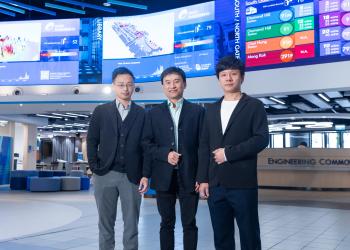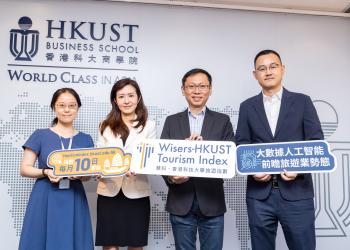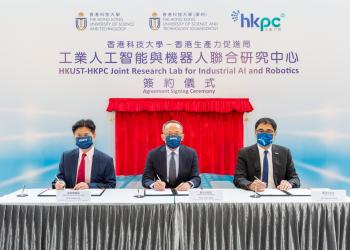News & Stories
2025

Stories
HKUST Community Benefits from Award-Winning AIoT Project to Estimate Queue Status and Occupancy
HKUST’s Engineering Commons, opened in 2013, has been the School of Engineering’s “family room” that enhances interaction of the engineering community and enables the display of top-notch research of its faculty members. Located at a key intersection of the campus, the Engineering Commons was renovated in 2024 after being used for more than a decade. As the Commons officially reopened in October 2024, it features an array of new research applications that are most relevant to campus life, including AIoT sensing research led by Prof. Gary CHAN Shueng-Han of the Department of Computer Science and Engineering.
2024

News
HKUST Spearheads Four Large AI Models to Revolutionize Healthcare
In a groundbreaking initiative, The Hong Kong University of Science and Technology (HKUST) has unveiled four AI-driven models poised to transform the medical and healthcare fields. These AI models can assist both general and specialist medical practitioners in diagnosing and prognosing up to 30 types of cancers and diseases, with some achieving accuracy comparable to that of medical experts with five years of experience or more.

News
HKUST Partners with Alibaba to Establish Joint Lab for Big Data and AI
The Hong Kong University of Science and Technology (HKUST) signed a memorandum of understanding (MoU) with Alibaba Group (Alibaba) today, outlying their plans to establish the “HKUST-Alibaba Joint Laboratory on Big Data and Artificial Intelligence”, with an aim to fostering forward-looking research in emerging technologies including generative AI and big data.
Signing the MoU on campus today were Prof. Tim CHENG, HKUST Vice-President (Research & Development) and WU Zeming, Chief Technology Officer of Alibaba Group. Under the agreement, Alibaba and HKUST plan to jointly establish the lab over the next three years, researching on frontier areas including AI, data science, language models, multimodal training and inference, computational infrastructure and system software. The joint lab and its research projects will be managed, coordinated and planned by committees formed by experts from both parties.
2023

News
HKUST and Wisers Launch Hong Kong’s First Forward-looking Tourism Index Supporting Tourism Recovery with AI-Powered Predictive Model
3 Aug, 2023 – The School of Business and Management of The Hong Kong University of Science and Technology (HKUST Business School) today launched the Wisers-HKUST Tourism Index (Tourism Index) in collaboration with Wisers Information Limited (Wisers) in support of Hong Kong’s tourism growth following the resumption of normal travel between Hong Kong and the Mainland. As Hong Kong’s first forward-looking tourism index leveraging artificial intelligence (AI)-powered forecasts, the project will enable industry stakeholders to better gauge near-term tourism outlook for pre-emptive policy and business planning, thereby contributing to the tourism industry’s long-term development.
2022
2021

News
AI-driven Resiliency
Patrick TU (right) and other cofounders of Dayta AI navigated through failures and challenges with resilience and determination.
Resilience is a survival trait for start-up entrepreneurs. Patrick TU and his teammates, all aged 26, knows well how to hustle out of setbacks, one after another, in their four-year entrepreneurship journey. Every failure points a new direction – that’s the belief that helps them bounce back and eventually build a start-up recognized by Forbes’ 30 Under 30.

News
The Robo-Advisory Firm Incubated in a Library
Don and Kelvin co-founded AQUMON in 2015 with the vision of democratizing financial services.
In 2015, when Dr. Don HUANG was still teaching financial engineering at HKUST, he received a call from his former bank colleague Kelvin LEI, asking whether he would be interested in starting a business with him. The answer was an instant “Yes!”
“Kelvin told me his vision of democratizing wealth management so that more people could enjoy better services. It wasn’t easy for the algorithms and financial modeling involved, but I immediately felt it was a great opportunity,” says the HKUST alumnus.










